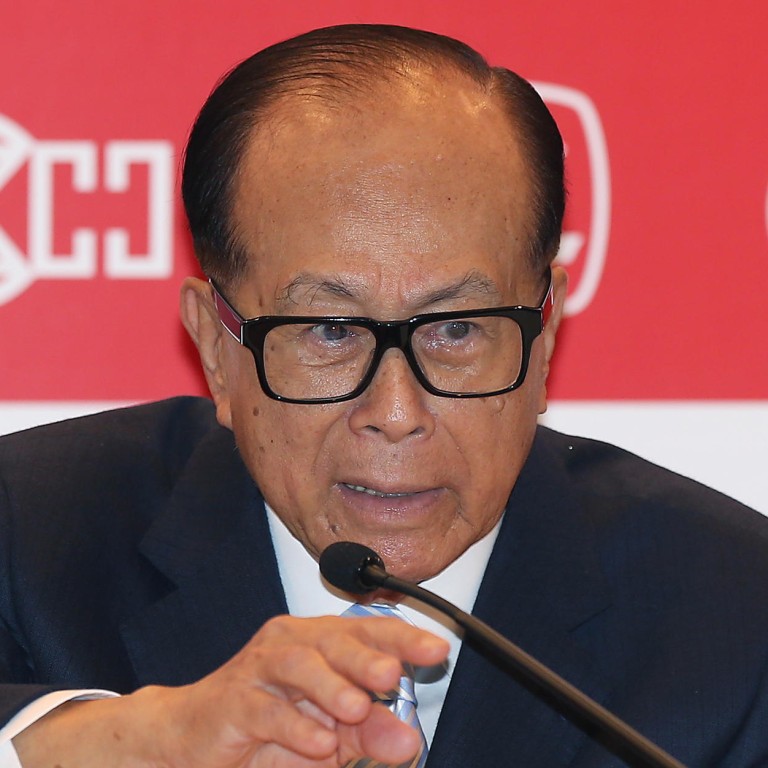
As Li Ka-shing's Hutchison loses its edge, it must reinvent itself
Li Ka-shing's broad portfolio does not compare well to focused and dynamic investment firms
Restructurings of family companies often reveal hard truths about their future.
Li Ka-shing's recent moves to sell assets in the Cheung Kong and Hutchison Whampoa stables are largely described as attempts to rebalance China exposure and extract value from stable but low-growth businesses.
But what they really show is his successful business model has come to an end.
The group is too big to offer superior returns as a local conglomerate, but it has not yet demonstrated an ability to successfully evolve and compete in today's global, large-cap investment environment.
Dominant, listed private equity giants like Carlyle … are more formidable deal-makers
Its opaque structures complicate things further.
Hutchison shares trade at a discount of between 33 per cent and 40 per cent to the group's net asset value. The fact that research analysts must examine about 66 business units to model that and make effective estimates shows how hard the group is to fathom.
Asset sales, spin-outs and better news from telecommunications business 3 Group Europe are driving a moment of transparency from this complicated investment holding group.
Hutchison's shares, as a result, have risen about 42 per cent from their low point in late June last year.
It is somewhat ironic that value is being driven through divesting rather than investing. Compare that with Facebook or Google, whose bold acquisitions and technology increase value.
Then again, neither Hutchison nor Cheung Kong have really been driven by world-class management prowess. Success has revolved around Li's legendary deal-making.
However, the Hutchison portfolio has become so diverse that there are no clear corporate synergies. After decades of opportunism, management doesn't possess a core competency other than supporting deal-making.
While Hutchison rebalances its holdings in Hong Kong and the mainland in favour of international aspirations in the United States or Europe, it faces tremendous competition from something it didn't face in the 1980s and 1990s - the growing power of private equity firms.
Opportunistic investment strategies that used to characterise the group are today more suitable for a family or private investment vehicle than a publicly listed company.
Non-family shareholders aren't well-served these days by such a broad portfolio. Today's savvy investors are demanding more sophistication.
For investors seeking diversified international returns, dominant, listed private equity giants like Carlyle, Blackstone or KKR are more formidable deal-makers than Cheung Kong and Hutchison.
Leading private equity firms are run by partnerships where the executives are heavily incentivised by a carried interest or direct shareholding in the returns of specific investments. They are managed quite differently from a family-owned company, where loyalty is valued over ability.
US private equity managers had some US$400 billion in unspent capital for buyouts at the end of last year, or 2.8 times the value of the deals they successfully concluded in 2013. Hutchison's competitors have equal access to capital markets and expertise.
Many of Hutchison's most prescient deals were made in the 1980s and not by its current leadership. Husky Energy was initiated by Simon Murray and Hutchison Telecom by Rick Siemens. Even AS Watson's expansion into Europe can be traced to Ian Wade.
The Li family can't compete against private equity managers. Instead, it should reimagine itself as a family office like the Fords or Rockefellers - invest and control, but withdraw from management, because the family's return and risk profile differs from those of other shareholders. Allow shareholders to benefit from professional management.
That process should begin by rationalising Hutchison into a container port operator and disposing of everything else, so it is easier to understand and run.
Unless the Lis can build a compelling international investment model, shareholders will inevitably wonder whether the controlling shareholder and his managers can produce superior returns outside Hong Kong.

